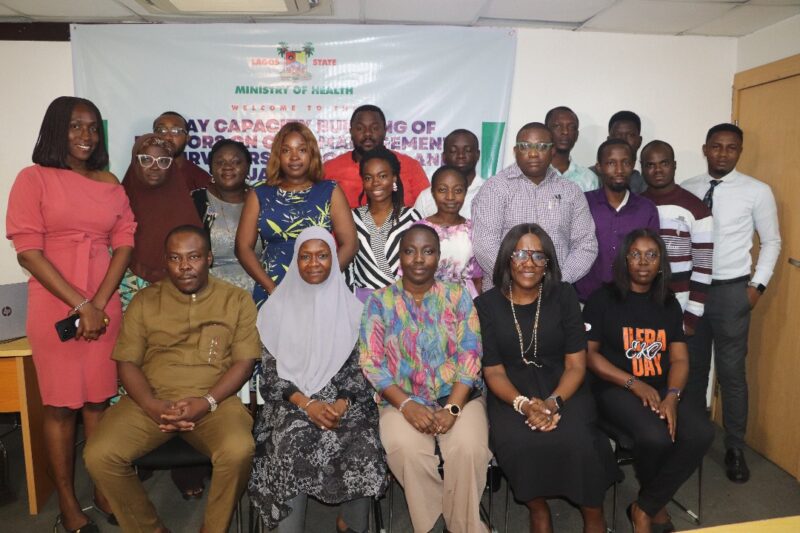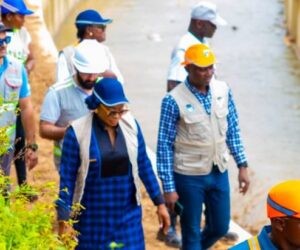2
… Strengthens Health System To Support Survivors
••• As Experts Emphasise Documentation, Timely care, Self-Care
Lagos – In a renewed effort to boost the response to sexual and gender-based violence (SGBV), the Lagos State Ministry of Health has trained healthcare workers across the state in the prevention and management of sexual assault. The training equips them with the skills to deliver professional, compassionate, and timely care to survivors.
The two-day training, held on Tuesday 11th and Wednesday 12th November 2025 at the Lagos Chamber of Commerce and Industry (LCCI), Alausa-Ikeja, brought together healthcare workers from public and private health facilities across all tiers of care in the state.
Declaring the training open, Dr. Folasade Oludara, Director, Family Health and Nutrition who was represented by Dr. Oluwatosin Onasanya, Deputy Director, Child Health, lamented the growing number of rape and defilement cases in Lagos communities.

Dr Onasanya noted that the escalating menace necessitated the upskilling of healthcare workers who are often the first responders to survivors.
She said the government recognised the critical role of health professionals in both clinical management and legal documentation of sexual assault cases.
Dr. Onasanya explained that the training was designed to ensure healthcare workers are adequately equipped to identify, document, and manage sexual assault cases effectively. “We’ve ensured participation from doctors and nurses at the primary, secondary, and tertiary levels who serve as first contact points for survivors,” she said, adding that the training would strengthen Lagos’ coordinated health system response to gender-based violence.
She disclosed that the state government had already provided equipment and specimen collection tools to health facilities and that the training complemented this investment by building the competence of personnel handling such sensitive cases. “Participants have been carefully selected from all 57 LGAs and LCDAs, particularly from areas with higher incident rates,” she said.
Also speaking, Dr. Juradat Aofiyebi, the SGBV Programme Manager, Lagos State Ministry of Health, emphasised that the capacity-building initiative was a strategic step toward improving survivor-centered healthcare delivery and prosecution outcomes. She stated that 25 experienced doctors drawn from the state’s general hospitals participated in the exercise, adding that the training underscored the government’s commitment to reducing the prevalence of sexual assault through a robust, multi-sectoral approach.
According to Dr. Aofiyebi, “The training provides healthcare workers with the knowledge to properly identify survivors, document findings accurately, and provide comprehensive care, all of which contribute to justice delivery and prevention of repeat offenses.” She reaffirmed that the ministry would sustain such trainings to ensure that every survivor who presents at a Lagos health facility receives quality, non-judgmental care.
Delivering her presentation, Mrs. Adebanke Ogunde, Deputy Director, Directorate of Public Prosecutions (DPP), Lagos State Ministry of Justice, highlighted the importance of medical documentation in sexual assault trials. She explained that most convictions are hinged on the quality of medical reports and forensic evidence provided by healthcare professionals. “Your medical reports are crucial; they can determine whether justice is served or denied,” she told participants.
Ogunde reminded health workers of their legal duty to report suspected sexual assault cases to the police or the Lagos State Domestic and Sexual Violence Agency (DSVA). “Doctors and nurses are mandatory reporters. Proper documentation, sample collection, and evidence preservation are essential,” she said, noting that under Section 291(3) of the Evidence Act, medical reports serve as vital corroborative evidence in court, particularly in cases involving children.
In his technical session, Dr. Oluwajimi Sodipo, Consultant Family Physician, Lagos State University Teaching Hospital (LASUTH), underscored the importance of timely medical attention, psychosocial support, and non-stigmatizing care for survivors. He explained that immediate presentation within 72 hours of assault improves chances of preventing infections and collecting viable forensic evidence.
Dr. Sodipo commended Lagos State for sustaining its inter-agency collaboration and continuous professional training on SGBV. However, he called for the strengthening of DNA and forensic capacities, improved insurance coverage, and better remuneration for healthcare workers. “We must sustain motivation and continuous retraining if we want to retain skilled professionals and enhance justice outcomes,” he added.
A presentation by Mrs. Anyebe Margret, Claims Officer, Lagos State Health Management Agency (LASHMA), detailed the integration of domestic and sexual violence response within the ILERA EKO Health Insurance Scheme. She explained that survivors of sexual and domestic violence are covered for medical treatment, investigations, and follow-up care under the state’s Equity Fund for vulnerable groups.
Mrs. Anyebe outlined that LASHMA’s defined roles include vetting hospital claims, coordinating emergency services, escalating cases to DSVA, and ensuring survivors receive full medical and financial protection. “Hospitals are to provide first-line care, document, and refer survivors appropriately, while LASHMA ensures prompt reimbursement and oversight,” she explained.
Another paper presented by Mrs. Ololade Babarere, Assistant Director, Health Education, Lagos State Ministry of Health, focused on self-care for healthcare workers who manage sexual assault cases. She noted that constant exposure to trauma can cause burnout, compassion fatigue, and emotional exhaustion among professionals, affecting service delivery and empathy.
Mrs. Babarere urged healthcare workers to develop coping mechanisms such as mindfulness, rest, exercise, and seeking peer or professional support when needed. “Taking care of yourself is not selfish, it is essential for sustaining compassion and professionalism,” she advised.
Participants expressed satisfaction with the training, describing it as highly impactful and relevant. Dr. Odiawa Ijeweme, Medical Officer at General Hospital, Apapa, said she gained practical knowledge on history-taking, examination, and proper referral processes for survivors. “We see such cases often, and now we can handle them more efficiently in line with Lagos State’s standard guidelines,” she said.
Another participant, Dr. (Mrs.) Charity Eferaro, Deputy Director, Health Services, Lagos State University Health Centre, Ojo, said the training had enhanced her capacity to handle sexual abuse cases among students. “This training has equipped me to provide holistic care; medically, emotionally, and psychologically, while ensuring survivors are not stigmatized,” she noted.
Overall, the two-day training reaffirmed the Lagos State Government’s determination to protect residents from all forms of sexual violence and strengthen institutional capacity for effective survivor-centered care. Through continuous collaboration between the Ministry of Health, Ministry of Justice, LASHMA, and DSVA, Lagos continues to lead by example in ensuring that survivors of sexual assault receive justice, dignity, and comprehensive healthcare.








